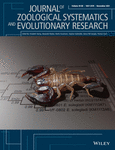Editorial
At the end of 2021, the editors of the Journal of Zoological Systematics and Evolutionary Research (JZSER) step down from their service for the journal. With a heavy heart, we finally decided to part with “our” journal. We tried until the end to make the transition to the new era of publishing for JZSER as smooth as possible while upholding editorial rigor and standards. To the dismay of some authors, we failed to circumnavigate all commercial obstacles — for that we apologize. Over the years, our journal has been a fountain for high-quality, original, solid, and inspiring research articles to us.
In 1963, inspired by the legendary and high-spirited annual meetings known as “Phylogenetisches Symposium,” the Zeitschrift für zoologische Systematik und Evolutionsforschung was founded by Wolf Herre, Curt Kosswig, Erich Reisinger, and Søren Ludvig Tuxen. In its first phase, this direct predecessor of the Journal of Zoological Systematics and Evolutionary Research published extensive papers, often doctoral theses or habilitation treatises. Most articles back then were published in German, but already at that time the journal attracted a more international readership and articles in English and French were published from authors of various countries in and also outside of Europe. Thirty years later, in 1994, the meanwhile well-established journal was renamed “Journal of Zoological Systematics and Evolutionary Research” (JZSER) and from that time on was published by Blackwell, Berlin, which moved in 2010 to Wiley (Oxford, UK). With progressing internationalization, JZSER became not only one of the leading zoological journals in Europe dealing with advances in zoological systematics and evolution, but also attracted articles from all over the world. JZSER became an outlet for many of the most influential researchers in zoological and evolutionary biology of the past 58 years.
In 2001/2002 the online version of JZSER was launched and the journal remained a hybrid journal for almost 20 years. In 2012, the online manuscript processing system ScholarOne was implemented for JZSER, considerably simplifying the handling of manuscripts by authors, reviewers, and editors. With the beginning of the year 2021, the printed version of JZSER was terminated and in summer, 2021 it was announced that JZSER is becoming part of a partnership between Wiley and Hindawi and will be fully open access in the future, with obligatory publication fees.
In this ever-accelerating world of scientific publishing, the aim of the JZSER editors throughout the years had been to provide a broad platform for high-quality publications in various fields of zoological systematics and evolutionary biology. This was only possible by a considerable investment of time and effort on the side of editors and reviewers, as scientific quality in the end is directly related to thoroughness. Under the new partnership with Hindawi, it is planned to accelerate the publishing process even further. In an “excitin era to come”, new technologies such as machine learning and artificial intelligence are planned to provide new tools presumably benefiting authors and publishers. With the end of 2021, the editors of the Journal of Zoological Systematics and Evolutionary Research step down from their function. This was not an easy step for us, as we all were very much dedicated to JZSER, “our” journal. We thank our Wiley Journal Managers, Editorial Office Team, and Production Team for many years of cooperation and wish that the Journal of Zoological Systematics and Evolutionary Research will continue to sustain its standing within the international scientific community.
List of editors of Journal of Zoological Systematics and Evolutionary Research, 1963–2021
Wolf Herre, Kiel (1963–1995)
Kurt Kosswig, Hamburg (1963–1981)
Erich Reisinger, Graz (1963–1979)
Søren Ludvig Tuxen, Copenhagen (1963–1983)
Günther Osche Freiburg (1981–2001)
Diether Sperlich, Tübingen (1983–2009)
Niels P. Kristensen, Copenhagen (1984–1995)
Henrik Enghoff, Copenhagen (1995–2002)
Martin Fischer, Jena (1995 to 2012)
Alessandro Minelli, Padua (2004–2012)
Olivier Rieppel, Chicago (2012–2013)
Wilfried Westheide, Osnabrück (2001–2012)
Elisabeth Haring, Vienna (2009–2021)
Stefan T. Hertwig, Bern (2009–2017)
Bernhard Misof, Bonn (2013)
Stefan Richter, Rostock (2013–2015)
Thomas Stach, Berlin (2013–2021)
Alexander Blanke, Bonn (2016–2021)
Barna Páll-Gergely, Budapest (2016–2021)
Stephan Koblmüller, Graz (2018–2021)
Martin Husemann, Hamburg (2020–2021)




